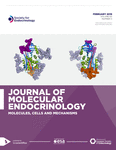Growth differentiation factor-15 upregulates interleukin-6 to promote tumorigenesis of prostate carcinoma PC-3 cells
- Ke-Hung Tsui1,2,*,
- Ying-Ling Chang3,*,
- Tsui-Hsia Feng4,
- Li-Chuan Chung5,
- Tzu-Yi Lee5,
- Phei-Lang Chang1,2 and
- Horng-Heng Juang2,5
- 1Department of Urology
2Bioinformation Center, Chang Gung Memorial Hospital, Kwei-Shan, Tao-Yuan, Taiwan
3School of Traditional Chinese Medicine
4School of Nursing
5Department of Anatomy, College of Medicine, Chang Gung University, 259 Wen-Hua 1st Road, Kwei-Shan, Tao-Yuan 333, Taiwan
- (Correspondence should be addressed to H-H Juang at Department of Anatomy, College of Medicine, Chang Gung University; Email: hhj143{at}mail.cgu.edu.tw)
Abstract
Growth differentiation factor-15 (GDF15), a member of the transforming growth factor-β superfamily, is associated with human cancer progress. We evaluated the role GDF15 plays in tumorigenesis of prostate carcinoma PC-3 cells. Results from real-time RT-PCR and ELISA revealed that expression of GDF15 was approximately threefold higher in LNCaP cells than in PC-3 cells. Other prostate cell lines (PZ-HPV-7, CA-HPV-10, and DU145 cells) expressed extremely low levels of GDF15. Stable overexpression of GDF15 in PC-3 cells enhanced the degree of cell proliferation and invasion as shown in the 3H-thymidine incorporation assay and in the Matrigel invasion assay respectively. Soft agar assays and xenograft animal studies indicated that overexpression of GDF15 in PC-3 cells increased tumorigenesis in vitro and in vivo. Results from RT-PCR, immunoblot, and reporter assays revealed that overexpression of GDF15 resulted in decreased expression of maspin and upregulation of interleukin-6 (IL6), matriptase, and N-myc downstream-regulated gene 1 (NDRG1) expression. Further studies revealed that overexpression of IL6 enhanced GDF15 expression in LNCaP cells while knockdown of IL6 blocked the expression of GDF15 in PC-3 cells, suggesting that expression of GDF15 is upregulated by IL6. This study demonstrated that expression of GDF15 induces cell proliferation, invasion, and tumorigenesis of prostate carcinoma PC-3 cells. The enhancement of tumorigenesis and invasiveness of prostate carcinoma cells that stably overexpress GDF15 may be caused by the dysregulation of maspin, matriptase, and IL6 gene expression. The expression of GDF15 and IL6 is controlled via a positive feedback loop in PC-3 cells.
- Revision received 28 July 2012
- Accepted 3 August 2012
- Made available online as an Accepted Preprint 7 August 2012
- © 2012 Society for Endocrinology











